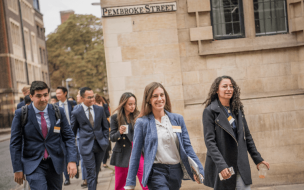The Cambridge MBA Culture, Arts, and Media Management concentration gives students a grounding in value creation, financial planning, market positioning, and human resources management. All of this will be vital in the post-coronavirus recovery as the arts sector grapples with huge losses.
But how does a sector of the economy that acts not only as a driver of revenue but of cultural expansion and education not just recover but thrive in a post-crisis world?
What will recovery look like?
Jeremy Newton (pictured below) leads the Culture, Arts, and Media Management concentration on the Cambridge Judge Business School MBA. He’s also the vice principal and director of advancement for the Guildhall School of Music & Drama.
He says that recovery post-pandemic means different things for different subsectors of the industry. Creative content companies like Spotify and Netflix have fared well, adding subscribers in large numbers and capitalizing on the crisis.
Film production, distribution, and exhibition, as well as the commercial art market have been hit hard but will likely recover quickly. The creative arts though—theatres, dance companies, orchestras, museums, and galleries—have suffered deep financial and organizational shock. Their recovery could take a decade.

What do the arts need to recover?
Allegra Markson (pictured right), a 2016 MBA graduate from the Culture, Arts, and Media Management concentration who now works as head of business development for arts technology company, Spektrix, is adamant that the conversations around recovery must center on talent retention and attraction.
“Those are the people we need right now to make sure that five, 10 years from now the arts are thriving. If there’s a significant creative and management brain drain, that’s going to have long-term and detrimental consequences for the industry.”

Strong leadership and influencing skills will be required from senior management, she adds. The recent $1.97 billion arts fund granted by the UK government was the result of three months of lobbying by industry leaders and bodies.
“How do you leverage the position you hold as a leader in your industry for the benefit of the wider sector?” Allegra asks. “I think that is absolutely crucial in an industry as interconnected as the arts.”
Jasmine Aslan, a current student on the Cambridge MBA, sees two key approaches the sector can use to recover.
One is using the crisis as an opportunity to revisit existing business models and strategies and decide in this context what is going to serve you well and what needs to be reworked. Another is to think entrepreneurially to capitalize on new technology which has allowed a huge spike in subscriptions to streaming services in recent months.
“Arts organizations’ experiments in streaming their works online is timely and an opportunity to capitalize on what may be increased demand for these types of products,” she explains, adding that an opportunity to study close to one of Europe’s largest technology clusters in Cambridge was a strong pull factor in her decision to join the MBA.
“I thought I would have a unique opportunity to gain a deeper understanding of existing and emerging technologies and the ways in which they could be utilized to the benefit of the arts,” she says.
To aid recovery the arts will need business savvy graduates with an entrepreneurial mindset who are skilled in strategic problem solving, talent management, and customer focus. They’ll also need the ability to manage change and uncertainty.
Jeremy explains that the key skills required to move the sector forward are in fact in relatively short supply. The creative sector has a history of poor structures for career development, training, and strategic leadership, he says.
That’s where the Cambridge MBA comes in.









